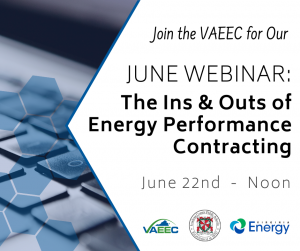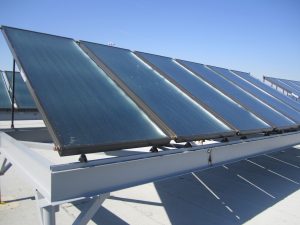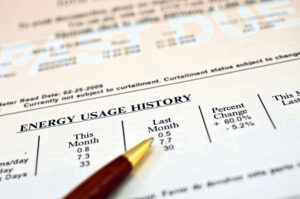The Ins & Outs of Energy Performance Contracting
 The Virginia Energy Efficiency Council (VAEEC) recently hosted a webinar, The Ins and Outs of Energy Performance Contracting, featuring Virginia Energy and Loudoun County Public Schools. The webinar provided an overview of how Energy Performance Contracting (EPC) works and the recent improvements to Virginia’s program. Loudoun County Public Schools recounted their experiences using EPC to enhance their buildings and meet their capital improvement and sustainability goals. Speakers included Nam Nguyen (Virginia Energy), Nick Polier (Virginia Energy), Michael Barancewicz (Loudoun County Public Schools), and Susan Gerson (Loudoun County Public Schools).
The Virginia Energy Efficiency Council (VAEEC) recently hosted a webinar, The Ins and Outs of Energy Performance Contracting, featuring Virginia Energy and Loudoun County Public Schools. The webinar provided an overview of how Energy Performance Contracting (EPC) works and the recent improvements to Virginia’s program. Loudoun County Public Schools recounted their experiences using EPC to enhance their buildings and meet their capital improvement and sustainability goals. Speakers included Nam Nguyen (Virginia Energy), Nick Polier (Virginia Energy), Michael Barancewicz (Loudoun County Public Schools), and Susan Gerson (Loudoun County Public Schools).
Energy Performance Contracting (EPC) is a budget-neutral option for state agencies, localities, public schools, and other public bodies to finance building upgrades while reducing energy use. Through EPC, public entities are able to improve their building performance, address maintenance needs, and reduce their energy consumption – all while achieving a guaranteed level of energy savings. Virginia’s program was established in 2002. To date, there have been more than 280 projects and over $1B in project investment.
EPC projects and customers include public K-12 schools and universities, localities, state agencies, regional jails, and correctional facilities. Virginia Energy provides support throughout the entire EPC process – from the design phase all the way through measurement and verification. This support comes at no cost to the customer and includes all necessary documents and templates to reduce time requirements. Customers are able to select an energy service company (ESCO) to perform the work from a prequalified vendor pool, which expedites the procurement process. The avoided costs from building upgrades pay for the cost of the project and there is a guaranteed energy saving.
 During this year’s General Assembly Session, the VAEEC worked with Virginia Energy and our ESCO members to update the Commonwealth’s existing EPC legislation. Once these laws take effect, EPC will be able to finance all roof repairs and full replacements, allowing public buildings to use EPC to become solar-ready. This will provide public bodies with the opportunity to fully finance solar under an EPC (see our fact sheet for more information).
During this year’s General Assembly Session, the VAEEC worked with Virginia Energy and our ESCO members to update the Commonwealth’s existing EPC legislation. Once these laws take effect, EPC will be able to finance all roof repairs and full replacements, allowing public buildings to use EPC to become solar-ready. This will provide public bodies with the opportunity to fully finance solar under an EPC (see our fact sheet for more information).
EPC has been particularly beneficial to some localities, such as Loudoun County, which is the fastest-growing county in Virginia with the third-largest school division. With sustainability in mind and the challenge of aging infrastructure, Loudoun County Public Schools reached a point where they could no longer reduce their energy usage without making significant investments. This led them to partner with Virginia Energy to pursue EPC. Through this first pilot project, LCPS saw a 75% kWh reduction, which was even better than the guaranteed level of energy savings. This positive experience led LCPS to continue to use EPC to not only address deferred maintenance and equipment upgrades, but to meet their capital improvement and sustainability goals.
 EPC provides the school system with the fiscal advantage of financing energy efficiency retrofits from realized future energy savings. Additional benefits include expertise in design, planning, implementation, and communication; resources that guarantee long-term success; the inclusion of non-energy conservation measures projects (such as security systems); and a trusted partnership between LCPS and their selected ESCO, CMTA. Not only did CMTA understand the nuances of working in an educational environment, but they offered staff training for LCPS employees and have participated in educational opportunities for students.
EPC provides the school system with the fiscal advantage of financing energy efficiency retrofits from realized future energy savings. Additional benefits include expertise in design, planning, implementation, and communication; resources that guarantee long-term success; the inclusion of non-energy conservation measures projects (such as security systems); and a trusted partnership between LCPS and their selected ESCO, CMTA. Not only did CMTA understand the nuances of working in an educational environment, but they offered staff training for LCPS employees and have participated in educational opportunities for students.
If you are interested in learning more about energy performance contracting, check out the resources below.
VAEEC EPC fact sheet (6/2022)
VAEEC EPC webpage
Virginia Energy EPC webpage
Webinar Presentation PDF (6/2022)
Webinar Recording link (6/2022)
